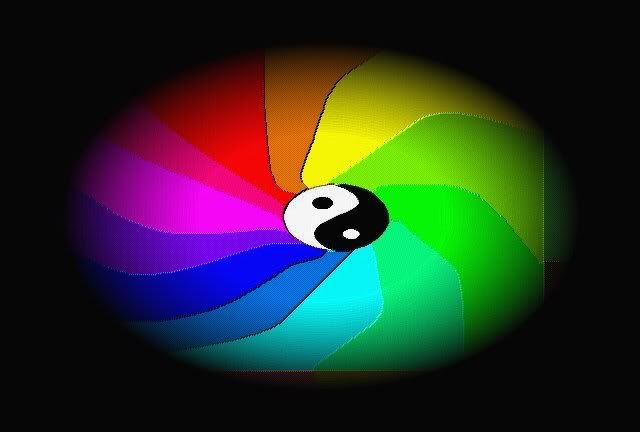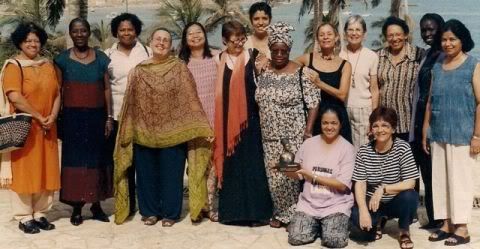
We had an interesting speaker on Tuesday.
Professor Gita Sen flew in from the Indian Institute of Management in Bangalore, India and talked about sustainability and community development. Writing about what she spoke about and an organization she is a main player with, Development Alternatives with Women for a New Era (DAWN) seemed like a worthwhile thing to do.
Of course there was always the possibility that a new diary topic could come to the fore. Or that one which has been brewing for a couple of weeks could demand to be written finally. The piece I had been ruminating about had actually earned a title: Yes, I want a pony. In fact, I want your pony.
That last deserves to stand by itself until it is ripe. If you want to fight over it, please wait until I post the essay that goes with it. Maybe if you continue reading, you might get a glimpse as to how it connects with the rest.
But of course, all hell had broken loose at the beginning of the week at Docudharma.
And that got me thinking about Professor Sen’s discussion of sustainable development…and whether or not there will ever be any application of it…or even possibility of it…in online communities.
 Dr. Sen (front row, left) is a professor of Public Policy at the Indian Institute of Management in Bangalore, India and a visiting professor at the Center for Population and Development Studies at the Harvard School of Public Health.
Dr. Sen (front row, left) is a professor of Public Policy at the Indian Institute of Management in Bangalore, India and a visiting professor at the Center for Population and Development Studies at the Harvard School of Public Health.
I suspect that the Bangalore part might be off-putting to some, since that’s where our outsourced IT jobs have gone: it is known as India’s Silicon Valley. But with development come problems. The IT explosion in Bangalore has been an ecological disaster. Instead of improving mass-transit with the new income, everyone bought cars. And of course, they needed high-end malls as places to spend that income. Meanwhile the disparity between rich and poor has expanded, of course. And as related to us by professor Rashmi Jaipal of the Center for Cultures and Communication here at Bloomfield, relating what an unnamed cab driver told her when she visited last year:
We used to have no money, but we could survive. Now we have money, but we can’t afford anything.
Dr. Sen discussed the differences between Bangalore and the plight of women in Koppal, which is located in the same state of Karnataka. Girls there are usually married by 15, the illiteracy rate for women is extremely high, and it is expected that most women will eventually die during childbirth. Dr. Sen works with various entities to try to bring health care to these women.
Of course, the increasing failure of the yearly monsoons because of global warming just exascerbates everything, but that’s another story…except not really.
The organization DAWN has a powerful vision for this world. I don’t believe they would object to me sharing their Vision Statement here:
We want a world where inequalities and discrimination based on gender and all other identities are eliminated from every country and from the relationships among countries and peoples; where development processes are founded on social solidarity and economic, political, ecological, social, and personal justice; where poverty and violence are eradicated; where human rights in their fullest and most expansive sense are the foundation of laws, public policies, and private actions.
We want a world where the massive resources now used to produce the means of destruction are diverted to building ethical and socially responsive development alternatives, promoting lasting peace, and justice within and outside the home; a world where people interact with ecological systems in humane and sustainable ways.
Such a world would ensure bodily integrity and security of personhood in every dimension of our lives, promote inclusiveness and respect for diversities, and realize sexual and reproductive rights for all. Women would share equally in determining priorities and making decisions at all levels and in every location, and all institutions would be committed to inclusive, participatory and democratic processes. We believe that respecting and realizing the human rights of all peoples in this way will affirm the ethical basis for a just and humane world.
Of course, I can hear it now: “Can’t be done.”
Whenever I hear that, It tears me up inside because I know that what it really means is that the people who say such things are unwilling to expend effort towards attaining the vision. It’s a self-fulfilling prophesy sort of thing.
Of course, as a feminist network, DAWN‘s four major themes reflect that focus:
1. Political Economy of Globalization
2. Sexual and Reproductive Health and Rights
3. Political Restructuring and Social Transformation
4. Political Ecology and Sustainability
Perhaps that is as good a place as any to divert to what else is on my mind, which is online communities…and how to develop sustainable ones.
First off, I’ve heard it all before from the people who don’t believe that there are such things as online communities, that if people aren’t local to each other, they cannot come together in such a thing.
Heard it all. Rejected it.
People find community wherever they find community. And the Interweb is just as much of a “wherever” as anyplace else. I sort of have the feeling that people who do not believe that communities form online are people who believe that if they belonged to such things, strictures would be put on their behavior…and that somehow that would be a bad thing.
Reject that as well.
I’ve belonged to quite a few online communities since I came online in the early 90s. Some of them have been stronger than others. Almost all started out with amazing intentions and grew to surpass those intentions. Generally they reached what might be called a Golden Age, a period where (at least from my point of view) deep discussions caused real community and individual growth.
Caveat: Almost all of those communities found that discussion of religion and guns were divisive issues and people were free to have their own views and let those views influence how they communicated with each other, but that and end to discussion of those issues could be called at any time.
Other than that, the basic rules involved: (1) no name-calling or personal attacks; (2) not bringing flame wars from one venue to another; and (3) trying to behave as if we were sitting in someone else’s living room…because essentially we were in the living rooms of the people who were reading what we had to say.
Discussion blossomed and the population would grow because other people heard what a good place it was. And with growth, unfortunately, would come problems…just as it does in the places Dr. Sen visits and speaks and writes about. Divisions in the community, call them cliques if you like (or don’t if you don’t like)…development of an us/them within the community…would end the Golden Age.
Bickering over what topics are fit for discussion and which are not often was a huge neon warning sign. We would hear, “Why do we always have to talk about that? Nobody’s interested in that anymore!” It has always been a puzzlement as to why people who say such a thing didn’t just bring up a different topic to start a new discussion.
But I’m losing the trail I’m trying to follow (perhaps wondering toward that pony thing). Was there a way for the growth to be sustainable? Most of the online communities I belonged to no longer exist. Some that I still belong to are well past their Golden Ages. Some of them fragmented. Some of them decided I no longer belonged and adopted rules which excluded me.
Sometimes I discovered that I no longer belonged and I left.
Stuff happens. It’s not always good stuff. We all have issues. One of my most difficult issues is having to live with being told…too many times, directly or indirectly…that I was no longer wanted. So when communities I have belonged to have dissolved or deteriorated or morphed into communities where I felt I no longer belonged, I felt real pain.
And that’s how I know online communities are real.
And that’s why I’d like a sincere discussion about sustainability…not that I necessarily expect one to break out. One can ask, but that doesn’t always mean one will get.
 Disjunction
|

29 comments
Skip to comment form
Author
…at present. Not all of it is good.
… do it is the same way. They are made up of populations, and the populations are made up of individuals that are born, mature, age, and die. In healthy ecosystems, the levels of populations cycle around the carrying capacity, as there is a direct feedback between being an individual in a population pressing up against the carrying capacity and having a higher risk of dying sooner.
And all those populations evolve – and over time, if there are empty niches, including niches created by the waste products of other populations, those niches get filled, and the ecosystem develops into a complex web of relationships.
My little experiment with making connections between the progressive blogosphere and the anime twittersphere probably won’t go anywhere – but it would be lovely if it does.
at a blog as if its the owners home. I try and be respectful, and if I don’t want to follow their rules, I don’t go there. Like in the meat world: I smoke, I allow smoking in my home. If someone doesn’t like it, they don’t have to come over, and by the same token if I go to someones home that doesn’t allow smoking, I don’t smoke inside while I’m there or I don’t go there.
With a community ownership its much harder because different people want different rules, or see the line between as being at a different place than others.
No idea how to clean the jute. Kitties seem to have a knack for breaking in new rugs.
Author
…in Orange.
“And that’s why I’d like a sincere discussion about sustainability…”